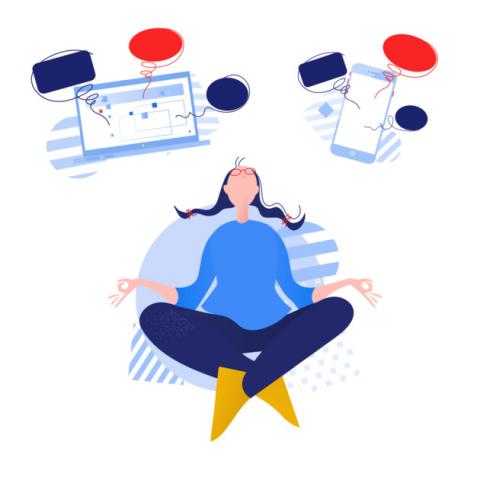Despite the growing popularity of mindfulness programs in the workplace, it can still feel a little weird to start a meeting at work with a meditation. Mindfulness is not for everyone. Nevertheless, scientists continue to amass evidence — intended to persuade rational Western minds — detailing the benefits of taking pauses during our days, including our workdays. Now we are learning that with regular practice our well-being can be cultivated.
The Center for Healthy Minds at the University of Wisconsin–Madison is one of the leading research institutions in the world dedicated to investigating the science of contemplative practices and the effects of those practices on well-being. The people who work there seek to create "a kinder, wiser, more compassionate world." Their researchers recently published a paper in The Proceedings of the National Academy of Sciences (PNAS) detailing a new "framework for the cultivation of human flourishing" which suggests that well-being can be cultivated through practicing specific skills in four core dimensions: awareness, connection, insight, and purpose.
The first area, awareness, includes mindfulness. They found that higher levels of awareness reduce anxiety and increase positive emotions. There are many ways for individuals to cultivate awareness, and one of the most effective methods is to shift attention to the breath in order to let go of worries about the past and concerns about the future. Rather than obsess about whether a comment in the last meeting came off as too harsh, let go of unhelpful thoughts of self loathing and instead come back to the breath. A pause before a meeting might simply be a moment for participants to notice their breathing.
The second area the researchers highlight is connection, meaning "a subjective sense of care and kinship toward other people that promotes supportive relationships and caring interactions." Pausing at the beginning and end of a meeting is a group activity. While the prospect of "intentional mental training" might sound like an individual pursuit, we can support each other along the way. Studies have show the even brief kindness meditations can reduce racial bias and deepen connections. At Lullabot we have experimented both with optional, Lullabot-only, meditation breaks as well as optional brief 1-2 minute meditations at the start of meetings with clients. We are not making scientific claims about cause and effect, but some employees of Lullabot, and some of our clients, have reported that they benefit from these shared pauses in their day.
The third area, insight, "refers to self-knowledge concerning the manner in which emotions, thoughts, beliefs, and other factors are shaping one’s subjective experience, and especially one’s sense of self." Simply pausing before a meeting provides an opportunity for participants to check in with themselves. Letting go of TODO lists and concerns about deadlines for even a moment or two allows for people to notice physical sensations, such as tension or pain, that they might otherwise ignore during the day. At companies like Eileen Fisher, employees ring a bell before each meeting "and everyone in the room sits together in silence for a few minutes" (Gelles, 164). If you "empty before you begin," to quote Tias Little, you might be less likely to start a meeting feeling angry or upset.
Purpose, the fourth area identified by the Center for Healthy Minds researchers, has to do with remembering the meaning and significance of our tasks. One day during the pause before meetings might be an occasion to recall what you enjoy about building websites and on another day you might connect with the mission of your client. It's so easy to get lost in the commotion of a work day and forget about why you do what you do. A brief pause before a meeting can serve as a reminder to check in and recall your purpose.
There are many ways to engage in mindful practices and cultivate well-being at work. At the California-based clothing company Prana, somebody rings a giant gong each day around 3pm to remind each person to "hit pause for a minute." Other companies, such as Google, Target, and General Mills, have developed their own mindfulness programs. A recent DrupalCon session offered advice for how to practice mindful movement in your chair. I invite you to try incorporating one of these approaches into your work and then to notice how it affects your well-being
If you are wondering what a brief meditation before a meeting might sound like, listen to one of the recordings below that are sometimes played before meetings at Lullabot:
References
Gelles, David. Mindful Work: How Meditation Is Changing Business from the Inside Out. New York: Houghton Mifflin Harcourt, 2015.
Little, Tias. The Practice Is the Path: Lessons and Reflections on the Transformative Power of Yoga. Boulder, Colorado: Shambhala, 2020.

Comments